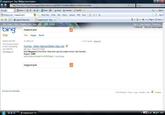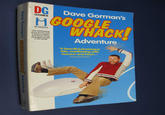Googlewhacking
Part of a series on Google. [View Related Entries]

| Navigation |
| About • Origin • Rules of Googlewhacking • Examples of (former) Googlewhacks • Spread • Search Interest • External References • Recent Images • Recent Videos |
About
Googlewhacking is the practice of entering a two word search into Google and receiving only one search result. Googlewhacking is a persistent hobby online.
Origin
Googlewhacking was first described in this original email from Brooks Talley from January 8th, 2002:[1]
… OK, this is kind of embarassing, but I've gotten addicted to looking
for combinations of common words which have the lowest incidence of
appearance on web pages, as indexed by google. So far, I have yet to
find a set of two common english words which do not appear together on
any web pages.The best I've done with three words is "orangutan popcorn fishwife",
which yeilds only one result. With four and more words it's pretty easy
to find combos with no results.FYI; I'm sure you were all anxious about that.
-b
The term "Googlewhack" was coined by Gary Stock[2] in his response to Brooks' email on January 8th, 2002:[3]
Regarding your habit of googlewhacking (nice triple entendre, eh?): 1: flatness strawberries magnification 1: jeweler parkways pathways 1: florists parkways practiced…
I'd nominate some categories, along with the elusive pure doublewhack: triplewhack with words all the same length; multiwhack beginning with sequential letters (1: applet badger catchy dabble)…Not fair to acknowledge word lists – too easy to spoof!
Gary Stock created the website Googlewhack to chronicle the instances.[4] Googlewhack.com initially kept a tally of whacks found, but no longer does. The page was not indexed by Google in order to avoid disqualifying the over 35,000 terms originally collected.
Rules of Googlewhacking
As found on the Googlewhack site:[5]
- 1. The two words ("Googlefactors") must both appear in Answers.com's dictionary. If one or both is not a legitimate word, it is called a "Googlejack."
- 2. A Googlewhack must bring back only one result.
- 3. If the page that contains the whack contains nothing but "a list of words (such as a bibliography, concordance, encyclopedia, glossary, thesaurus, dictionary, domain names, or plain old machine-generated random garbage)," it does not count.
Examples of (former) Googlewhacks
- Ambidextrous scallywags
- Illuminatus ombudsman
- Squirreling dervishes
- Assonant octosyllable
- Fetishized armadillo
- Panfish interrogation
- Disenthralled nimrod
- Elephantiasis rhinovirus
Spread
Many news outlets wrote articles on the phenomenon including the New York Times in February 2002[6] and the Guardian Observer in October 2003.[7]
Part of the reason for Googlewhacking's popularity could be attributed to British comedian Dave Gorman. In 2003, he toured the UK, US, Canada, Australia, and France with his live show called "Dave Gorman's GoogleWhack Adventure" and also wrote a similarly titled book on the subject.[8]
On February 20, 2004, "Googlewhacking" was chosen as the Word of the Week on the Macmillian English Dictionary blog.
Also in 2004, New Scientist discussed the idea of a "Googlewhackblatt," which was finding a single word, instead of a phrase, that would yield a single result.[9] Over the course of that year, several people wrote into the magazine to get their Googlewhacks published.
In 2008, GoogleTechTalks on YouTube posted a video presentation of a study conducted by Jonathan Lansey entitled "Googlewhacks for Fun and Profit."
In the study, Lansey developed a model to describe search result values. They used the total number of indexed Google pages and applied the Zipf's power law to the word per page distribution and Heap's law for unique word counts.[10] "Based on data from 351 word pairs each with exactly one hit when searched for together, and a Zipf law coefficient determined in other studies, [they] approximate the Heaps' law coefficient for the indexed world wide web (about 8 billion pages) to be beta=.52."
A paper on the subject was published February 2009 in the Journal of Quantitative Linguistics (doi: 10.1080/09296170802514153).
Search Interest
Searches for "Googlewhack" and "Googlewhacking" seem to have spiked just after the creation of Google Insights, experiencing a few peaks and valleys before settling roughly into equilibrium around mid-2008.
External References
[2] Googlewhack – Who's Gary Stock?
[6] New York Times – Love Letters, One-Hit Wonders and Sites Unseen
[7] The Guardian Observer – When Google puts a world out of whack
[8] Amazon – Dave Gorman's Googlewhack Adventure
[10] Wikipedia – Heap's Law












Comments ( 62 )
Sorry, but you must activate your account to post a comment.
Please check your email for your activation code.